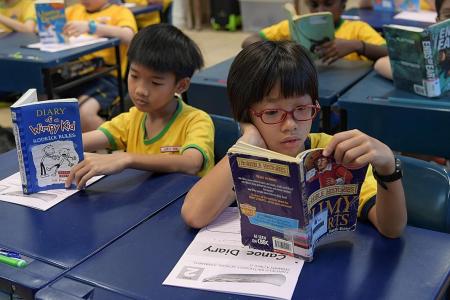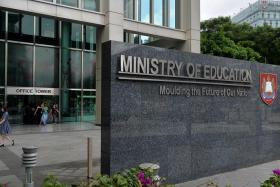Singapore primary school pupils rank No. 2 in global reading test
Primary 4 pupils in Singapore have emerged second out of 58 territories in an international test that measured how well they can read.
The results of the Progress in International Reading Literacy Study (PIRLS), released last month, also found that pupils here outperformed their peers in other countries in navigating online texts.
Singapore pupils came up tops - surpassing 13 other territories and countries, including the US - in the online task, where they answered questions related to information on the Web.
This is the first time the study - conducted every five years since 2001 - has included a section to assess how pupils understand online information, to capture the nature of how young people consume information in a digital age.
About 6,500 pupils from all 177 primary schools here took the test in 2016.
More than 319,000 pupils worldwide took part.
Russia was top out of 58 education systems, while Hong Kong was third, Ireland fourth and Finland fifth.
Singapore was fourth out of 45 education systems in the previous study in 2011.
The test, sponsored by the International Association for the Evaluation of Educational Achievement, evaluated pupils' reading and comprehension skills, such as connecting pieces of information, and making inferences from texts.
Pupils were given two reading passages - narrative fiction as well as information-based texts such as news articles - and had to answer multiple-choice and written-response questions.
More than a quarter - 29 per cent - of Singapore pupils achieved the "advanced" benchmark, which is the highest level of attainment in the 2016 study. The international proportion of such pupils was 10 per cent.
The Ministry of Education (MOE) attributed Singapore's improvement to changes in the way the English language has been taught in schools in the past decade, such as the introduction of the Strategies for English Language Learning and Reading (Stellar).
Under Stellar, grammar and vocabulary are taught through children's stories and texts instead of textbooks and worksheets.
Ms Sofia Gita Parkash, head of the English language department at Fairfield Methodist Primary School, said it pairs upper primary pupils with younger ones to help them with reading.
"We want pupils to learn how to greet people, how to code switch, how to react to different situations, cultures and contexts," she said.
The Pirls report also found that children whose parents engaged them in activities such as reading or talking from a young age, or sang to them, did better than those who did not get the same level of exposure.
FOR MORE, READ THE STRAITS TIMES TODAY
Get The New Paper on your phone with the free TNP app. Download from the Apple App Store or Google Play Store now



